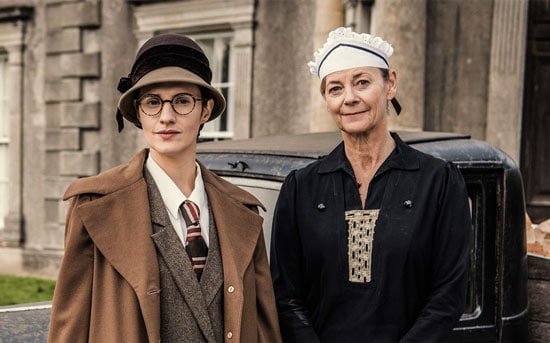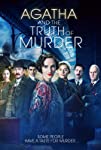Eye For Film >> Movies >> Agatha And The Truth Of Murder (2018) Film Review
Agatha And The Truth Of Murder
Reviewed by: Jennie Kermode

On Monday the 12th of January 1920, a young woman by the name of Florence Nightingale Shore - goddaughter of the heroine of the Crimean War - caught a train from Victoria to Hastings. She was seen off by her close friend Mabel, who - though it was kept quiet given the nature of English society at the time - was probably her partner. Somewhere on the subsequent journey, she was repeatedly struck over the head with a blunt object. She dies in hospital three days later without ever regaining consciousness.
On Friday the 3rd of December 1926, the famous mystery writer Agatha Christie went missing. Despite a nationwide police search her whereabouts remained unknown for 11 days despite a nationwide police search. She would claim until the end of her days that she had no memory of what happened to her during that time.

Terry Loane's film, scripted by Tom Dalton, brings these two true stories together to create a light but cleverly constructed fantasy which fans of traditional drawing room whodunnits will love.
This is a format so particular that the film is difficult to review with the general viewer in mind. Whatever your approach, however, there's much to admire. Ruth Bradley is brittle yet sympathetic in the lead (considerably more the latter than Ms Christie was said to be in real life). the supporting cast are all highly capable and the parallels with Christie's own work are wittily drawn. The stately home to which Agatha lures the murder suspects on the pretext that she's a lawyer trying to clarify the proper distribution of an inheritance achieves the perfect blend of elegance and dilapidation, and Marion McCarthy's costumes are exquisite. Though some viewers might find it rather dry, with Mabel's grief displaying itself as obsession rather than something more colourful, there are more emotive subplots, including a delicately sketched romance between two of the suspects and, in accordance with real life events, an exploration of Agatha's difficulties in facing up to the fact that her husband doesn't love her anymore.
It's in the nature of these things that some viewers will correctly place the guilt for Florence's murder straight away, but Dalton doesn't make it easy to be sure, delivering a liberal supply of red herrings. The ending comes with a further twist which calls our expectations of the genre into question and might briefly remind you of one of the more unusual short stories by Arthur Conan Doyle, who briefly appears as a character, played by Michael McElhatton.
Fans of Christie's work will enjoy the way the film references and comments on her satirical treatment of issues around racism, homophobia and the rights of women, with certain characters seeming as if they could be lifted straight from her pages but revealing depths beyond those of the stereotypes she was pointing up. The conceit here is, throughout, that this is real life and not to be interpreted in the same way as a mystery novel. Dalton goes so far as to suggest that she learned from the experience.
Providing literary pleasures without ever being too aloof, and indulging in the occasional bit of low comedy as some of Christie's working class characters were wont to, this is a film that strikes a careful balance. It doesn't have anything of great import to communicate and it won't provide the same thrills as a blockbuster, but it's a smart, well made little film which is much more satisfying to watch than its humble origins and restricted format might suggest.
Reviewed on: 05 Apr 2020

















